Did you know most airline accidents are caused by someone’s gut instinct being ignored? In most cases, somebody knew something that didn’t feel right. According to Compassionate Accountability: How Leaders Build Connection and Get Results author Nate Regier PhD, they either didn’t say anything or tried to say something and were shut down. You never know; the feelings you have inside might help you avoid a bigger accident later.
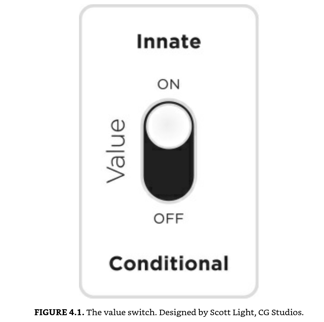 Many leaders feel emotions shouldn’t be a part of the business environment. Yet our personal experiences and emotions are integral to who we are as people. As humans, we feel. Minimizing feelings is indicative of turning off our value switch.
Many leaders feel emotions shouldn’t be a part of the business environment. Yet our personal experiences and emotions are integral to who we are as people. As humans, we feel. Minimizing feelings is indicative of turning off our value switch.
Turning on the value switch involves the fundamental belief that people are unconditionally valuable. Everyone deserves to be valued for who they are as a person, with no strings attached. This applies especially to our unique experiences, perspectives, and emotions.
When the value switch is off, we view our own or another person’s value as conditional, which means we allow conditions such as individual differences, group affiliations, past experience, or performance to influence our perceptions of a person’s value.
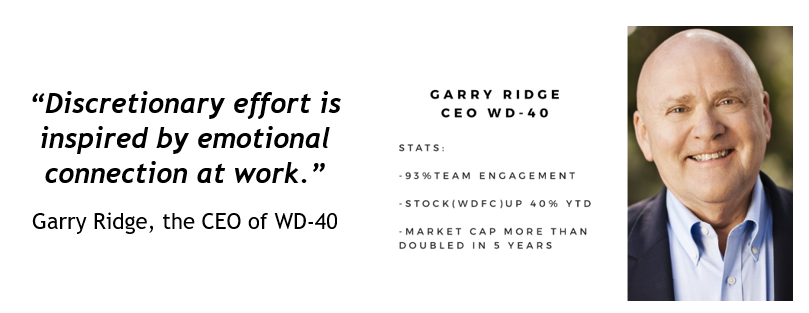 Garry Ridge, chairman and CEO of WD-40 for twenty-five years and up through the pandemic, credits its success to the company’s compassionate culture, based on Garry’s philosophy that a tribe is more successful than a team. He believes, “Discretionary effort is inspired by emotional connection at work.”
Garry Ridge, chairman and CEO of WD-40 for twenty-five years and up through the pandemic, credits its success to the company’s compassionate culture, based on Garry’s philosophy that a tribe is more successful than a team. He believes, “Discretionary effort is inspired by emotional connection at work.”
This doesn’t mean we turn off holding our team responsible and accountable. Compassionate Accountability enhances your connection to your people. By doing so, it impacts and increases accountability!
When Your Value Switch is Off
Author, Nate Reiger shares a quote from Gloria Cotton, an expert in Diversity, equity, and inclusion, “Are you on a treasure hunt or a scavenger hunt?” Reiger points out, that scavenger hunters expect to find what’s wrong and use it as leverage.
Treasure hunters expect to find treasure and affirm it.
Which are you?
It might be helpful to understand what it looks like when our value switch is on and off.
Does your behavior fall into any of these clusters?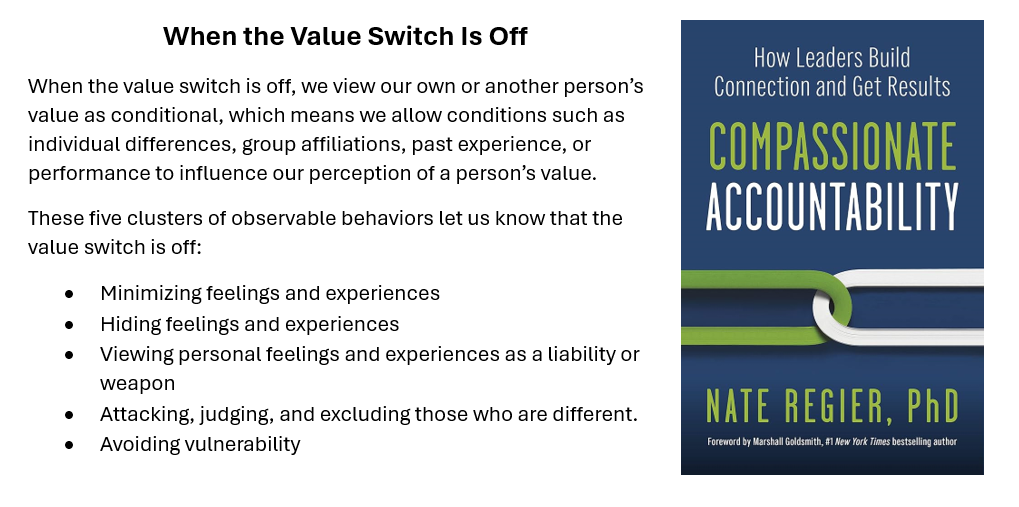
- Minimizing feelings and experiences - we might dismiss or devalue a person’s feelings as if they aren’t relevant or don’t matter. When we do this, we send the message they are less valuable as a human.
- Hiding feelings and experiences - By doing this, we deprive others of seeing us for who we are or of being able to support us. By hiding our feelings, we treat them as illegitimate, defective, or invisible while also devaluing ourselves in the process.
- Viewing personal feelings and experiences as a liability or weapon - When we view feelings as weak, we imply that a person’s value is dependent on removing feelings or at least keeping them under control. Emotional hijacking occurs when someone uses feelings to divert attention away from the real issue or avoid accountability for their behavior.
- Attacking, judging, and excluding those who are different - Individual differences are viewed as a threat to the status quo, power and control structures, or our own identity. Whenever we view diversity as a threat, we send the message that showing who you truly are will get you hurt or alienated. Value is conditional on being the same and fitting in.
- Avoiding vulnerability - we feel vulnerable whenever we allow our emotions and personal experiences to come to the surface because we’ve made value conditional on being strong, being the same, and keeping our issues behind closed doors. When the value switch is off, the result is an unsafe, toxic environment in which people are judged and excluded.
Turn on Your Value Switch
How do you turn your value switch on?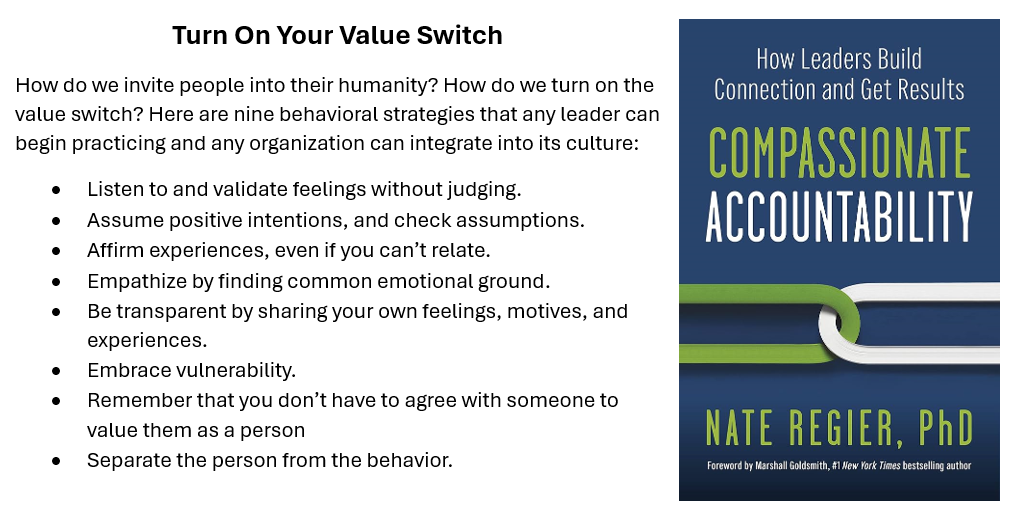
Compassionate Accountability shares nine behavioral strategies you can practice and integrate into your culture:
- Listen to and validate feelings without judging. - When we listen, we see them for who they are, without judgment or conditions.
- Assume positive intentions, and check assumptions. – Are you a Scavenger or Treasure Hunter? Scavenger hunters expect to find what’s wrong and use it as leverage. Treasure hunters expect to find treasure and affirm it.
- Affirm experiences, even if you can’t relate. – Be open-minded and curious. Affirm another person’s experiences. If you can’t feel what another person is feeling, you can learn and better understand what they’re going through. It’s called cognitive empathy.
- Empathize by finding common emotional ground.- Emotions are meant to be shared. Without that, we can become lonely, even around others. Empathy isn’t about having the exact same experience. It’s about having a similar emotional response.
- Be transparent by sharing your feelings, motives, and experiences. -
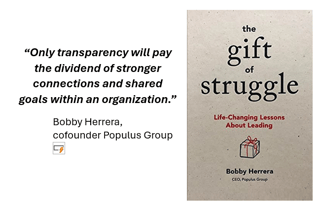 How can people struggle with you if they don’t know what you are struggling with? For compassion to work between people, we must be honest about our feelings, motives, and experiences. Most people aren’t. We keep our feelings hidden, or we sugarcoat them to avoid dealing with the real stuff.
How can people struggle with you if they don’t know what you are struggling with? For compassion to work between people, we must be honest about our feelings, motives, and experiences. Most people aren’t. We keep our feelings hidden, or we sugarcoat them to avoid dealing with the real stuff. - Embrace vulnerability. – Author Adam Grant notes “Vulnerability is not the opposite of resilience. Vulnerability builds resilience.
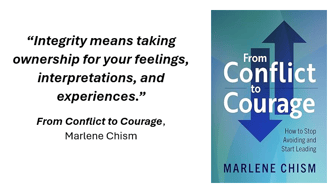 Projecting perfection protects your ego but shuts people out and stunts your growth. Revealing struggles shows humility and humanity, opening the door to new sources of support and strength.”
Projecting perfection protects your ego but shuts people out and stunts your growth. Revealing struggles shows humility and humanity, opening the door to new sources of support and strength.” - Remember that you don’t have to agree with someone to value them as a person. - Leaders who encourage different viewpoints and stay curious can benefit from the wealth of experience on their teams and find better solutions to problems.
- Separate the person from the behavior. - Compassion is about getting personal without making it personal. This doesn’t mean these conversations are easy. It’s uncomfortable talking about performance or behavior gaps with employees. Follow two important principles - focus on behavior, avoid assumptions about character or intentions, and avoid trying to manage other people’s feelings. You are responsible for your feelings and behaviors, not theirs. We don’t need to manage their emotions.
- Include and leverage diversity. Compassion views diversity as an opportunity. When our value switch is on, we go beyond tolerating and celebrating. We actively search for and utilize diversity to make us better.
Comparison - Value Switch On – Value Switch Off
To help you recognize when your value switch is on and off, the table should help.
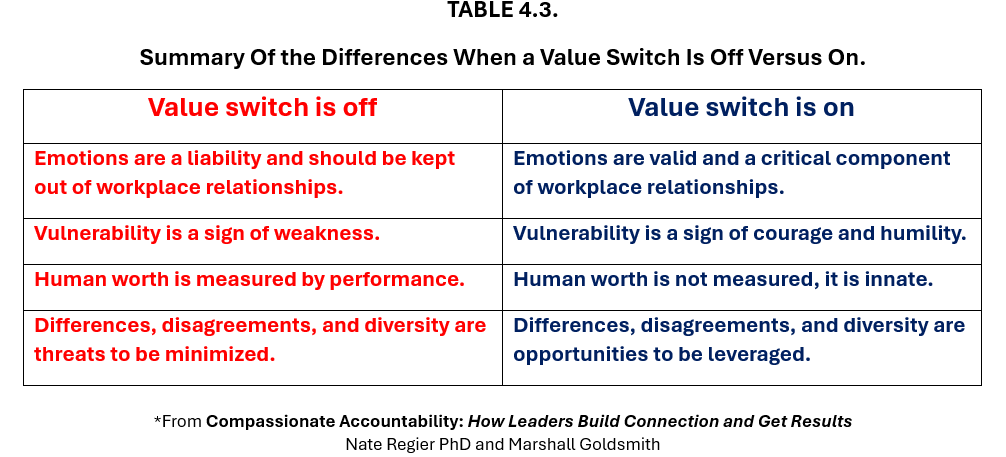
My video provides a good example of how my father unknowingly diminished my sense of value as a child. Over time by sharing his vulnerability I felt how much he loved me.
Turning on the value switch involves the fundamental belief: that people are unconditionally valuable!
Are you guilty of being too critical, read Three Reasons Never to Blame or Criticize
To create an environment where everyone is inspired to give their best, contact Positioning Systems to schedule a free exploratory meeting.
Turn your team into a growth organization.
Growth demands Strategic Discipline.
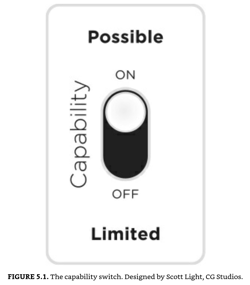 Turning on the capability switch involves the fundamental belief that anyone can be part of the solution. Our unique qualities, skills, and experiences deserve to be affirmed, and we deserve the opportunity to contribute, learn, and grow in a collaborative environment. Next blog, we explore the second switch of the compassion mindset, the switch of capability.
Turning on the capability switch involves the fundamental belief that anyone can be part of the solution. Our unique qualities, skills, and experiences deserve to be affirmed, and we deserve the opportunity to contribute, learn, and grow in a collaborative environment. Next blog, we explore the second switch of the compassion mindset, the switch of capability.
Building an enduring great organization requires disciplined people, disciplined thought, disciplined action, superior results, producing a distinctive impact on the world.
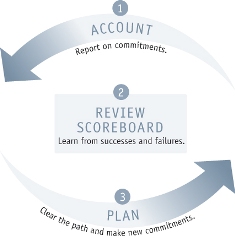 Discipline sustains momentum, over a long period of time, laying the foundations for lasting endurance.
Discipline sustains momentum, over a long period of time, laying the foundations for lasting endurance.
A winning habit starts with 3 Strategic Disciplines: Priority, Metrics, and Meeting Rhythms. Forecasting, accountability, individual, and team performance improve dramatically.
Meeting Rhythms achieve a disciplined focus on performance metrics to drive growth.
Let Positioning Systems help your business achieve these outcomes on the Four most Important Decisions your business faces:
|
DECISION |
RESULT/OUTCOME |
|
PEOPLE |
|
|
STRATEGY |
|
|
EXECUTION |
|
|
CASH |
|
Positioning Systems helps mid-sized ($5M - $500M+) businesses Scale-UP. We align your business to focus on Your One Thing! Contact dwick@positioningsystems.com to Scale Up your business! Take our Four Decisions Needs Assessment to discover how your business measures against other Scaled Up companies. We’ll contact you.
NEXT BLOG – Turn On Your Capability Switch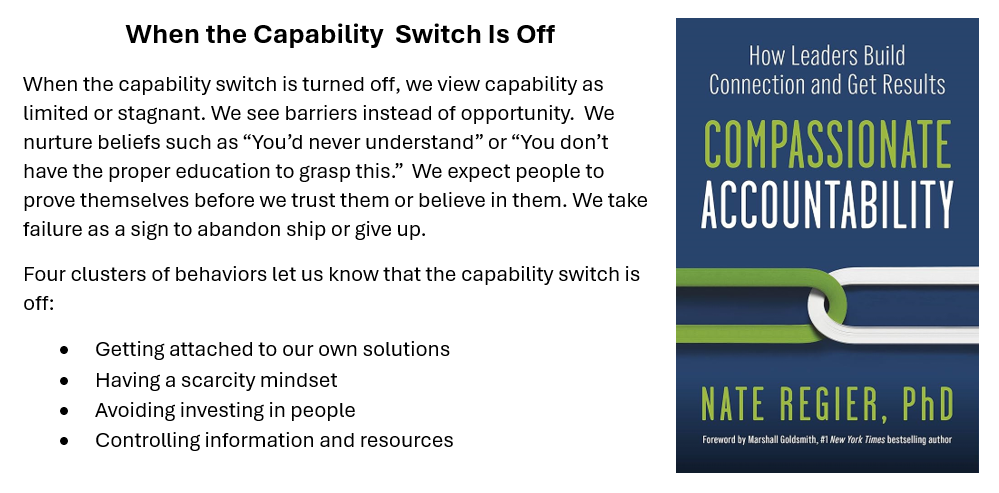






.jpeg?width=150&height=135&name=Hand%20with%20marker%20writing%20the%20question%20Whats%20Next_%20(1).jpeg)

